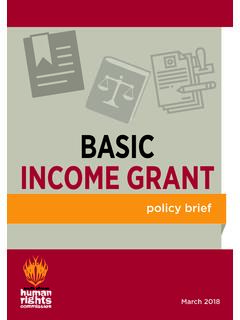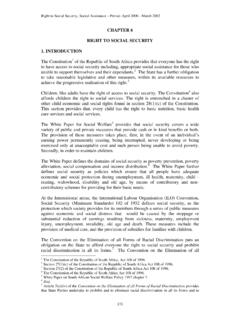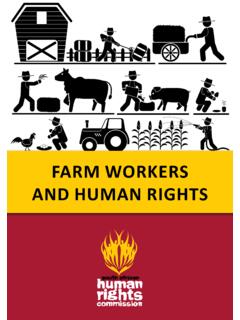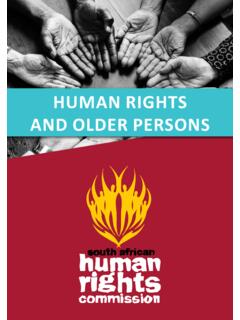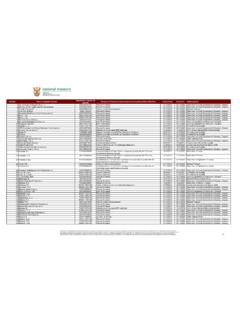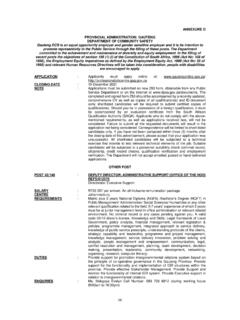Transcription of ACCESS TO HEALTH CARE - sahrc.org.za
1 ACCESS TO. HEALTH CARE. ACCESS TO HEALTH CARE 1. BACKGROUND. The South African Human Rights Commission (SAHRC) is an independent institution established in terms of Chapter 9 of the Constitution of the Republic of South Africa, (the Constitution) to support constitutional democracy. The mandate of the SAHRC is to promote, protect and monitor the observance of human rights in the Republic. In line with its promotional mandate, the SAHRC must educate and raise awareness to promote respect for human rights and a culture of human rights. The SAHRC has developed this information sheet to provide the general public with basic information on the right to ACCESS HEALTH care. THE RIGHT TO HAVE ACCESS TO HEALTH CARE. The right to have ACCESS to HEALTH care services is a basic human right guaranteed by the Constitution. Section 27 of the Constitution provides that everyone has the right to have ACCESS to HEALTH care services, including reproductive HEALTH care services and no one may be refused emergency medical treatment.
2 The Constitution and the National HEALTH Act 61 of 2003 (as amended). envisage a single HEALTH system for South Africa. However, in addition to public HEALTH care a number of private HEALTH care service providers exist in country. The State uses a means test to determine who qualifies for ACCESS to free medical services. In addition, the Minister of HEALTH may from time to time determine who is eligible for basic HEALTH care services. The right to ACCESS HEALTH care includes pregnant or lactating women and pregnant women who are eligible for termination of pregnancy services in accordance with the Choice of Termination of Pregnancy Act 92 of 1996. In addition, all children are entitled to ACCESS basic HEALTH care, which right is reinforced by the special protections for the rights of children entrenched in Section 28 of the Constitution. The right to HEALTH care can however be limited in certain instances, depending on the availability of resources. However, the right cannot be denied completely.
3 ACCESS TO HEALTH CARE 1. CURRENT STATUS OF ACCESS . TO HEALTH CARE SERVICES. IN SOUTH AFRICA. South Africa remains an unequal society, where the quality and type of services people receive tends to be influenced significantly by their socio-economic status and ability to ACCESS to services, regardless of the level of need for care. The majority of people in South Africa depend on public HEALTH care facilities to ACCESS their right to HEALTH care services. A. small number of people are able to afford private medical care. In its 2016 General Household Survey Statistics South Africa reported that only 17 of every 100 South Africans have medical insurance, and as many as 45 million or 82 out of every 100 South Africans fall outside the medical aid net and, are largely dependent on public HEALTH care. The number of people who depend on the public HEALTH system in South Africa is likely to be much higher as a number of people who are undocumented also rely primarily on the public HEALTH system to ACCESS HEALTH care services.
4 82 of every 17 of every 100. South Africans have medical insurance 100. South Africans fall outside the medical aid net 2 ACCESS TO HEALTH CARE. High demand on the public HEALTH care system impacts timeliness, range and quality of services provided to users. Private healthcare is administered by medical scheme providers which are costly and out of reach for the majority of people seeking ACCESS to HEALTH care services. An inquiry by the Competition Commission revealed that only 17% of the population, primarily in urban areas are able to afford private HEALTH care which is provided by approximately 5000 private practitioners. The services provided by the private sector therefore invariably meet standards characterised by high quality, timeliness, and ease of ACCESS for those who are able to afford the service. The private sector HEALTH industry is however not without challenges which have implications for its users and providers. Many of these relate to a lack of competition in respect of pricing, and charges for treatments that may not always be necessary.
5 In contrast the remaining 80% of the population are serviced by approximately 4000 public HEALTH facilities, which despite high levels of expertise, remain in a constant battle to adequately meet demands. Some of the challenges experienced in respect of ACCESS to HEALTH care services are recorded in the reports by the SAHRC arising from its investigations into ACCESS to Healthcare Services and into ACCESS to Emergency Medical Services in the Eastern Cape respectively. The SAHRC found that public HEALTH care services are largely under-resourced in terms of personnel, availability of suitable medication and infrastructure; conditions which are adversely impacting the ability to deliver adequate care to poor people, especially to those in rural areas. The reports noted serious shortages of emergency transport, long waiting times, and over-crowding, compromised cleanliness, out-dated technology, under-staffing and discriminatory attitudes towards vulnerable groups as major concerns. ACCESS TO HEALTH CARE 3.
6 The SAHRC's 2017 Investigative Hearing on the State of Oncology in KwaZulu Natal Report found that long delays, and in some cases a denial of oncology services to cancer patients in KwaZulu Natal were evident in all public HEALTH facilities in the province, with serious implications for both prevention and treatment of cancer for members of the public seeking medical assistance. These problems were exacerbated for large numbers of people particularly those travelling from rural areas, women, children and the elderly. The SAHRC 2018 National Investigative Hearing on the Status of Mental HEALTH Care in South Africa Report reiterated that the shortage of skills, training and resources negatively impacted on the rights of additionally vulnerable groups such as mentally ill patients. Poor treatment, abuse and neglect of patients result, not only in a denial of their rights to ACCESS HEALTH , but also violate their right to be treated with dignity. Based on its monitoring and complaints regarding the right to ACCESS HEALTH in almost all provinces of the country, the SAHRC is conducting inspections at several hospitals in the Free State, gauteng , Kwa Zulu Natal, Northern Cape, North West and Limpopo provinces.
7 Given systemic challenges in the provision of ACCESS to HEALTH services, the Department of HEALTH is spearheading reforms through the National HEALTH Insurance Bill, which aims at changing the inequalities within the HEALTH system. The proposed National HEALTH Insurance Fund proposes a population based approach where the State will allocate budgets for the provision of services which take into account the number of people living in an area, and what their HEALTH care needs are. Broadly the Bill will allow services from all HEALTH professionals to be secured and delivered through both public and private facilities. 4 ACCESS TO HEALTH CARE. THE ROLE AND RESPONSIBILITY OF. GOVERNMENT WITH REGARDS TO HEALTH . CARE SERVICES. The Constitution provides that the State must respect, protect, promote and fulfil the rights enshrined in the Bill of Rights, which includes the right to have ACCESS to HEALTH care services. The Constitution further provides that the State must take reasonable measures within its available resources to achieve the progressive realisation of the right to have ACCESS to HEALTH care services, including reproductive HEALTH care.
8 The Department of HEALTH , together with the provincial departments of HEALTH have the responsibility to provide HEALTH care services in the country. In order to create ease of ACCESS and reduce demand on hospitals, clinics at local level provide basic HEALTH care services. Clinics refer appropriate cases to hospitals assigned to receive patients from particular areas. These hospitals in turn refer complex matters to larger designated hospitals which are equipped to deliver certain expert services. Despite the arrangements; backlogs and long waiting lists are common at various levels of the referral system. National HEALTH Act 13 of 2013 and ACCESS to Emergency Medical Treatment The Act gives effect and content to the right to ACCESS HEALTH care services as provided for in the Constitution. It outlines the laws that govern national, provincial and local government with regard to the provision of HEALTH services. Beyond regulating the provision of HEALTH care services by the different spheres of government, the Act also recognises and creates responsibilities in terms of the provision of medical treatment in cases of medical emergencies.
9 ACCESS TO HEALTH CARE 5. Emergency medical treatment The Constitution and the National HEALTH Act provide that no one may be refused emergency medical treatment by any HEALTH care provider, HEALTH care worker or HEALTH establishment. A HEALTH establishment means any clinic or hospital, private or public. The rules in respect of the types and location of hospitals do not apply in respect of ACCESS to emergency medical treatment. Both private and public hospitals must provide treatment to people experiencing a medical emergency. Private hospitals will stabilise such patients and transfer them to public HEALTH hospitals where such individuals do not have medical HEALTH insurance. By way of example, if a person has been involved in an accident and needs urgent medical attention, such a person may not be refused emergency medical treatment by a private institution simply because the person does not have private HEALTH insurance. Similarly a private ambulance is obliged to transport such person to the closest hospital, and the facility needs to stabilise the person before requesting payment and transferring such a patient to an appropriate facility if they do not have private medical aid insurance.
10 Responsibilities of a HEALTH care provider A HEALTH care provider means any person who provides HEALTH services in terms of any law, and includes doctors or nurses. Such a person has the responsibility to inform a HEALTH care user of the following: Their HEALTH status except in circumstances where there is substantial evidence that such disclosure would be contrary to the best interest of the user. This means that a HEALTH care provider has a responsibility to tell the user what (if anything), is wrong with their HEALTH ;. 6 ACCESS TO HEALTH CARE. The range of diagnostic procedures and treatment options generally available to them, including the benefits, risks, costs and consequences generally associated with each option. This means that a HEALTH care provider must inform the user of all the options the user can choose from as well as all the consequences that come with choosing any of the mentioned options for treatment;. The user's right to refuse HEALTH services and explanation of the implications, risks and obligation of refusal.

